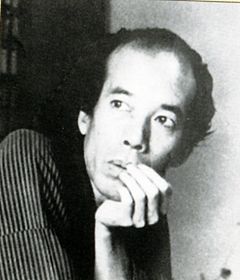- Sanjugo Naoki
-
Sanjugo Naoki 
Naoki SanjūgoBorn 12 February 1891
Osaka, JapanDied 24 February 1934 (aged 43)
Tokyo, JapanOccupation Writer Genres novels and literary criticism In this Japanese name, the family name is "Naoki".Sanjugo Naoki (直木 三十五 Naoki Sanjūgo) was the pen-name of a novelist in Taishō and Shōwa period Japan. His real name was Sōichi Uemura (植村 宗一 Uemura Sōichi).
Contents
Early life
Naoki Sanjūgo was born in Osaka. He attended the English Literature department of Waseda University in Tokyo but never graduated. At first, he attempted to start a publishing business, but went bankrupt and returned to Osaka shortly after Great Kantō Earthquake of 1923.
Literary career
Naoki started working in Osaka as editor of the literary magazine Kuraku (Joys and Sorrows), and contributed his own works of fiction as well. Although interested in the new trends toward the cinema, he also experimented with movie script-writing, but failed to interest any movie studios. In 1927, he decided to move back to Tokyo where opportunities looked more promising. He obtained a post at the literary magazine Bungei Shunju, where he developed a reputation for writing scathing literary criticism, mixed with scandalous gossip about the writer, which outraged many of his contemporaries.
In 1929, he succeeded in having an historical novel, Yui Kongen Taisakki, serialized in a weekly magazine, and a similar historical novel about the Satsuma Rebellion, Nangoku Taiheiki, serialized in a newspaper following year. The success of these established him firmly as a writer of popular fiction.
Naoki had a reputation for being eccentric, as evidenced by his choice of a pen-name, which he changed four times between ages 31 and 35 to match his age that particular year (skipping over 34, as four was an unlucky number according to Japanese superstition). When he reached age 35 (Sanjūgo), he decided to keep the same name from that point onwards.
As well as historical novels such as Araki Mataemon and Odoriko Gyojoki, Naoki also wrote biographies of historical figures, including Kusunoki Masashige, Ashikaga Takauji, and Genkuro Yoshitsune, as well as contemporary social fiction, including Nihon no Senritsu ("Japan Shudders"), and Hikari: Tsumi to Tomoni ("Light: With Crime"). His historical novel Mito Komon Kaikokuki was the basis of a movie, followed by the extremely long-running television series Mito Komon, which remains popular to this day, and which is largely responsible for turning the historical Tokugawa Mitsukuni into a folk hero.
Naoki died in 1934 at the age of 43 from an acute case of Japanese Encephalitis. His grave is located at the temple of Chosho-ji in Kanazawa ward, Yokohama.
Legacy
In 1935, on the suggestion of Kikuchi Kan (founder of the Bungei Shunju magazine), Naoki's name was given to an award for popular fiction, the Naoki Prize. Alongside the Akutagawa Prize for new writers, it is one of the most prestigious literary awards in Japan.
References
- Fukuyama, Hikomaro. Naoki Sanjūgo Nyumon-Konna omoshiroi hito data. Shinpu Shobo. ASIN: 488269574X (Japanese)
See also
- Japanese literature
- List of Japanese authors
- Naoki Prize
External links
- e-texts of works at Aozora Bunko (Japanese site)
- Naoki Sanjūgo Memorial Museum in Osaka (Japanese site)
- Literary Figures of Kamakura
Categories:- Japanese novelists
- Japanese literary critics
- Writers from Osaka (city)
- Waseda University alumni
- 1881 births
- 1934 deaths
Wikimedia Foundation. 2010.
